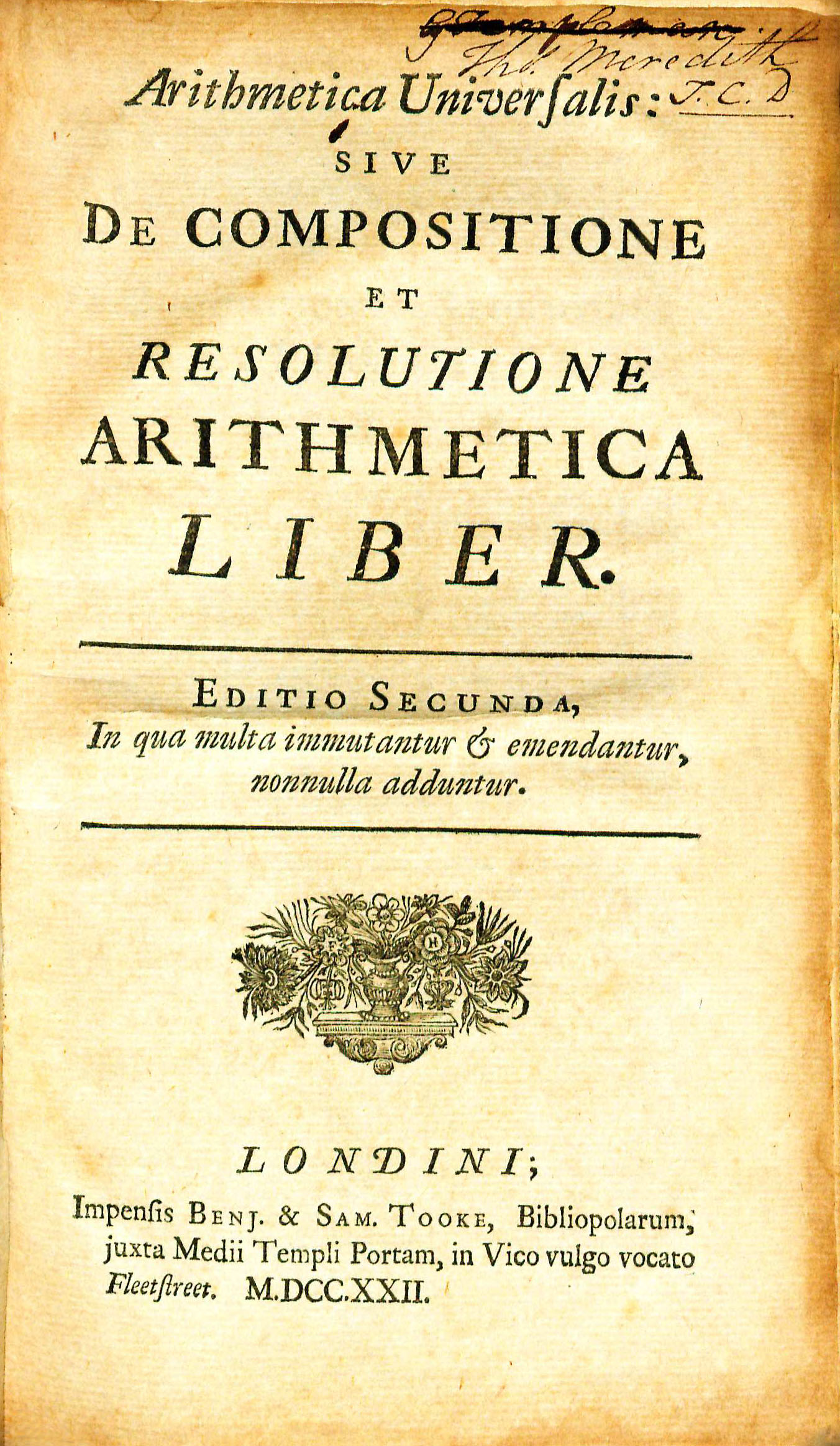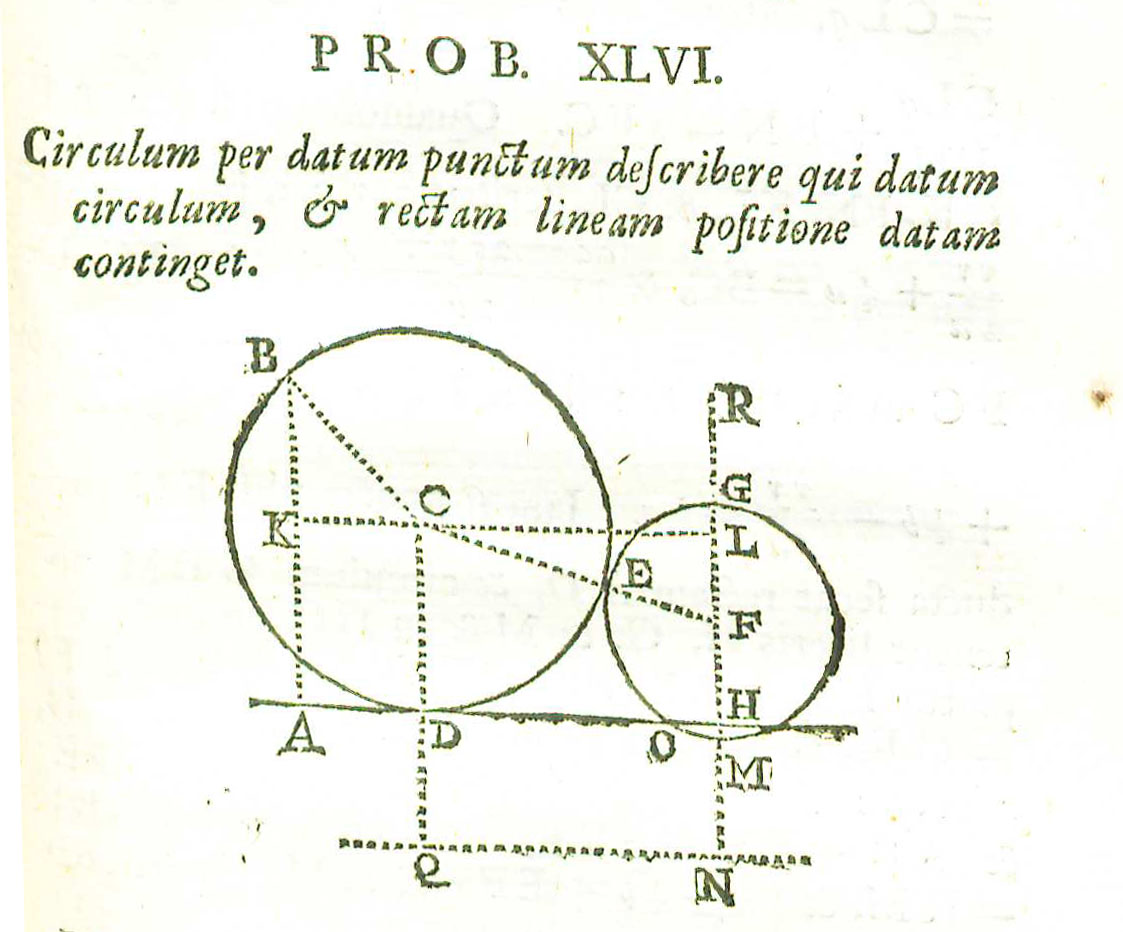Difference between revisions of "Arithmetica Universalis"
m |
|||
| (9 intermediate revisions by 6 users not shown) | |||
| Line 1: | Line 1: | ||
| − | {{DISPLAYTITLE: | + | {{DISPLAYTITLE:''Arithmetica Universalis: Sive De Compositione Et Resolutione Arithmetica Liber''}} |
| − | |||
===by Sir Isaac Newton=== | ===by Sir Isaac Newton=== | ||
__NOTOC__ | __NOTOC__ | ||
{{BookPageInfoBox | {{BookPageInfoBox | ||
|imagename=NewtonArithmeticaUniversalisTitlePage1722.jpg | |imagename=NewtonArithmeticaUniversalisTitlePage1722.jpg | ||
| − | |link=https:// | + | |link=https://wm.primo.exlibrisgroup.com/permalink/01COWM_INST/g9pr7p/alma991017608569703196 |
|shorttitle=Arithmetica Universalis | |shorttitle=Arithmetica Universalis | ||
| − | |author=Sir Isaac Newton | + | |author=[[:Category:Isaac Newton|Sir Isaac Newton]] |
| − | |publoc=London | + | |publoc=[[:Category:London|London]] |
|publisher=Benji & Sam. Tooke | |publisher=Benji & Sam. Tooke | ||
|year=1722 | |year=1722 | ||
|edition=Editio secunda, in qua multa immutantur & emendantur, nonnulla adduntur | |edition=Editio secunda, in qua multa immutantur & emendantur, nonnulla adduntur | ||
| − | |lang=Latin | + | |lang=[[:Category:Latin|Latin]] |
|pages=332 | |pages=332 | ||
| − | |desc=8vo | + | |desc=[[:Category:Octavos|8vo]] (22 cm.) |
| + | |shelf=N-3 | ||
}}Sir Issac Newton (1642-1727) was a philosopher and mathematician. In 1661, Newton arrived in Cambridge to attend Trinity College. He entered as a sub-sizar where he performed menial tasks in order to stay enrolled and pay for his education. The ‘Quaestions quaedam’ launched Newton’s scientific career.<ref>Richard S. Westfall, [http://www.oxforddnb.com.proxy.wm.edu/view/article/20059 "Newton, Sir Isaac (1642–1727)"] in ''Oxford Dictionary of National Biography'' (Oxford University Press, 2004- ), accessed October 3, 2013.</ref><br /> | }}Sir Issac Newton (1642-1727) was a philosopher and mathematician. In 1661, Newton arrived in Cambridge to attend Trinity College. He entered as a sub-sizar where he performed menial tasks in order to stay enrolled and pay for his education. The ‘Quaestions quaedam’ launched Newton’s scientific career.<ref>Richard S. Westfall, [http://www.oxforddnb.com.proxy.wm.edu/view/article/20059 "Newton, Sir Isaac (1642–1727)"] in ''Oxford Dictionary of National Biography'' (Oxford University Press, 2004- ), accessed October 3, 2013.</ref><br /> | ||
<br /> | <br /> | ||
| Line 23: | Line 23: | ||
==Evidence for Inclusion in Wythe's Library== | ==Evidence for Inclusion in Wythe's Library== | ||
| − | Listed in the [[Jefferson Inventory]] of [[Wythe's Library]] as | + | Listed in the [[Jefferson Inventory]] of [[Wythe's Library]] as "Arithmetica Universalis Newtoni. 8vo." and given by [[Thomas Jefferson]] to his grandson [[Thomas Jefferson Randolph]]. The precise edition owned by Wythe is unknown. [http://www.librarything.com/profile/GeorgeWythe George Wythe's Library]<ref>''LibraryThing'', s. v. [http://www.librarything.com/profile/GeorgeWythe "Member: George Wythe"], accessed on November 13, 2013, </ref> on LibraryThing indicates this, adding "Octavo editions in Latin were published at Cambridge/London in 1707 and London in 1722." The [https://digitalarchive.wm.edu/handle/10288/13433 Brown Bibliography]<ref> Bennie Brown, "The Library of George Wythe of Williamsburg and Richmond," (unpublished manuscript, May, 2012) Microsoft Word file. Earlier edition available at: https://digitalarchive.wm.edu/handle/10288/13433</ref> lists the 2nd London edition. The Wolf Law Library followed Brown's suggestion and purchased the 1722 edition. |
==Description of the Wolf Law Library's copy== | ==Description of the Wolf Law Library's copy== | ||
Bound in contemporary paneled calf, expertly rebacked with red morocco label. Purchased from Ted Steinbock.<br /> | Bound in contemporary paneled calf, expertly rebacked with red morocco label. Purchased from Ted Steinbock.<br /> | ||
<br /> | <br /> | ||
| − | View this book in [https:// | + | Images of the library's copy of this book are [https://www.flickr.com/photos/wolflawlibrary/sets/72157637446569516 available on Flickr.] View the record for this book in [https://wm.primo.exlibrisgroup.com/permalink/01COWM_INST/g9pr7p/alma991017608569703196 William & Mary's online catalog]. |
| + | |||
| + | ==See also== | ||
| + | *[[George Wythe Room]] | ||
| + | *[[Jefferson Inventory]] | ||
| + | *[[Wythe's Library]] | ||
| + | |||
==References== | ==References== | ||
<references/> | <references/> | ||
[[Category:George Wythe Collection at William & Mary's Wolf Law Library]] | [[Category:George Wythe Collection at William & Mary's Wolf Law Library]] | ||
| + | [[Category:Isaac Newton]] | ||
[[Category:Mathematics and Engineering]] | [[Category:Mathematics and Engineering]] | ||
| + | [[Category:Thomas Jefferson Randolph's Books]] | ||
[[Category:Titles in Wythe's Library]] | [[Category:Titles in Wythe's Library]] | ||
| + | |||
| + | [[Category:Latin]] | ||
| + | [[Category:London]] | ||
| + | [[Category:Octavos]] | ||
Latest revision as of 10:33, 5 June 2023
by Sir Isaac Newton
| Arithmetica Universalis | |
|
Title page from Arithmetica Universalis, George Wythe Collection, Wolf Law Library, College of William & Mary. | |
| Author | Sir Isaac Newton |
| Published | London: Benji & Sam. Tooke |
| Date | 1722 |
| Edition | Editio secunda, in qua multa immutantur & emendantur, nonnulla adduntur |
| Language | Latin |
| Pages | 332 |
| Desc. | 8vo (22 cm.) |
| Location | Shelf N-3 |
Sir Issac Newton (1642-1727) was a philosopher and mathematician. In 1661, Newton arrived in Cambridge to attend Trinity College. He entered as a sub-sizar where he performed menial tasks in order to stay enrolled and pay for his education. The ‘Quaestions quaedam’ launched Newton’s scientific career.[1]
Newton's manuscripts were originally made available to acolytes, who copied and translated them. However, his original theories were often mutilated. Changes in publishing practices of mathematics in the latter half of the seventeenth century compelled Newton to publish some of his works.[2] However, he maintained a scribe and public lecture mentality, and most of his works did not go into print until after his death.
Based on lecture notes by Newton from the period 1673 to 1683, Arithmetica Universalis was first printed in Latin in Cambridge in 1707. In this work, Newton covers the essentials of algebra: notation, addition, subtraction, multiplication, division, extraction of roots, reduction of fractions, reduction of geometrical questions to equations, and resolution of equations. In addition, Newton extended Descartes' rule of signs to imaginary roots. He also formulated a rule to determine the number of imaginary roots of any equation.[3]
Evidence for Inclusion in Wythe's Library
Listed in the Jefferson Inventory of Wythe's Library as "Arithmetica Universalis Newtoni. 8vo." and given by Thomas Jefferson to his grandson Thomas Jefferson Randolph. The precise edition owned by Wythe is unknown. George Wythe's Library[4] on LibraryThing indicates this, adding "Octavo editions in Latin were published at Cambridge/London in 1707 and London in 1722." The Brown Bibliography[5] lists the 2nd London edition. The Wolf Law Library followed Brown's suggestion and purchased the 1722 edition.
Description of the Wolf Law Library's copy
Bound in contemporary paneled calf, expertly rebacked with red morocco label. Purchased from Ted Steinbock.
Images of the library's copy of this book are available on Flickr. View the record for this book in William & Mary's online catalog.
See also
References
- ↑ Richard S. Westfall, "Newton, Sir Isaac (1642–1727)" in Oxford Dictionary of National Biography (Oxford University Press, 2004- ), accessed October 3, 2013.
- ↑ Niccolo Guicciardini. "Issac Newton and the Publication of His Mathematical Manuscripts," Studies in History and Philosophy of Science, Part A 35, no. 3 (2004): 455-470.
- ↑ Ibid.
- ↑ LibraryThing, s. v. "Member: George Wythe", accessed on November 13, 2013,
- ↑ Bennie Brown, "The Library of George Wythe of Williamsburg and Richmond," (unpublished manuscript, May, 2012) Microsoft Word file. Earlier edition available at: https://digitalarchive.wm.edu/handle/10288/13433

